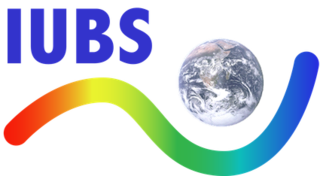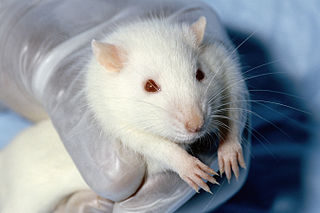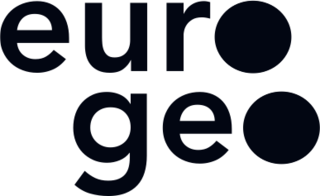The Royal Academies for Science and the Arts of Belgium (RASAB) is a non-governmental association which promotes and organises science and the arts in Belgium by coordinating the national and international activities of its constituent academies such as the National Scientific Committees and the representation of Belgium in international scientific organisations.

Heinrich Heine University Düsseldorf is a public university in North Rhine-Westphalia, Germany, which was founded in 1965 as the successor organisation to Düsseldorf's Medical Academy of 1907 and was named after German poet Heinrich Heine.

The International Union of Biological Sciences (IUBS) is a non-profit organization and non-governmental organization, founded in 1919, that promotes the biological sciences internationally. As a scientific umbrella organization it was a founding member of the International Council for Science (ICSU).
Geoinformatics is the science and technology that develop and use data, software, and computing facilities in the cyberinfrastructure ecosystem to address the needs of geosciences and related branches of science and engineering.

The Association for Psychological Science (APS), previously the American Psychological Society, is an international non-profit organization whose mission is to promote, protect, and advance the interests of scientifically oriented psychology in research, application, teaching, and the improvement of human welfare. APS publishes several journals, holds an annual meeting, disseminates psychological science research findings to the general public, and works with policymakers to strengthen support for scientific psychology.

The Institute of Forest of the Siberian Division of the Russian Academy of Sciences is the first academic institution of a forest profile in Russia. It was founded in 1944 in Moscow by native biologist academician Vladimir Nikolayevich Sukachev. The institute was named after him in 1967. In 1959 the institute was assigned to the Siberian Division of the Academy of Sciences of the USSR and transferred to Krasnoyarsk.

The Mexican Academy of Sciences(Academia Mexicana de Ciencias) is a non-profit organization comprising over 1800 distinguished Mexican scientists, attached to various institutions in the country, as well as a number of eminent foreign colleagues, including various Nobel Prize winners. The organization, which encompasses exact and natural sciences as well as the social sciences and humanities, is founded on the belief that education, based on the truth of scientific knowledge, is the only means, in the short and long term, of achieving the development of the Mexican spirit and national sovereignty.

The Agence universitaire de la Francophonie is a global network of French-speaking higher-education and research institutions. Founded in Montreal, Quebec, Canada in 1961, as the Association des Universités Partiellement ou Entièrement de Langue Française (AUPELF), the AUF is a multilateral institution supporting co-operation and solidarity among French-speaking universities and institutions. It operates in French-speaking and non-speaking countries of Africa, the Arab world, Southeast Asia, North and South America, Polynesia, the Caribbean, Central, Eastern and Western Europe. As of 2020, the AUF has 1,007 members distributed throughout francophone countries on six continents. It is active in 119 countries, and represented by regional offices and information centers on campuses and in institutes. The Association receives funding from the Organisation internationale de la Francophonie (OIF), and its headquarters are located at the Université de Montréal, Quebec.
The Klaus Tschira Stiftung (KTS) is a German foundation established by the physicist Klaus Tschira in 1995 as a non-profit organization. Its primary objective is to support projects in the natural and computer sciences as well as mathematics. The KTS places strong emphasis on the public understanding in these fields. Klaus Tschira’s commitment to this objective was honored in 1999 with the "Deutscher Stifterpreis" by the German National Academic Foundation. The KTS is located at the Villa Bosch in Heidelberg, Germany, the former residence of Nobel Prize laureate for chemistry Carl Bosch (1874–1940).
The Panel for the Future of Science and Technology (STOA) is a panel of 27 members of the European Parliament devoted to all issues related to science and technology assessment.

Animal testing regulations are guidelines that permit and control the use of non-human animals for scientific experimentation. They vary greatly around the world, but most governments aim to control the number of times individual animals may be used; the overall numbers used; and the degree of pain that may be inflicted without anesthetic.
The Global Labour University (GLU) is an international network of universities, trade unions, NGOs and the International Labour Organisation. It was initiated in 2002 and offers master's programs, academic certificate programs and Massive Open Online Courses (MOOC) on sustainable development, social justice, international labour standards and trade/labour unions, economic policies and global institutions.
E-Science librarianship refers to a role for librarians in e-Science.

Borys Grinchenko Kyiv University is a higher education institution. The university was established by Kyiv municipal council through reorganization of Kyiv regional Teachers Training Institute named after Borys Hrinchenko. The university is communal property.

Nazarbayev University (NU) is an autonomous research university in Astana, Kazakhstan. It was founded by former President of Kazakhstan-Nursultan Nazarbayev- in June 2010, it is an English-medium institution, with an international faculty and staff.

EUROGEO is a European scientific society, which networks geographers. It is an international non-governmental organisation. Since 1987 EUROGEO has been a participative member of the Conference of International NGOs of the Council of Europe. The association is involved in national and international activities and projects in geography including those related to education and training. It is a not profit organisation, which aims to develop, support and promote policies designed to advance the status of geography; establish and promote cross-border cooperation; promote education and training in geography from a European perspective and represent nationally and internationally the views of its members.
The UK Data Service is the largest digital repository for quantitative and qualitative social science and humanities research data in the United Kingdom. The organisation is funded by the UK government through the Economic and Social Research Council and is led by the UK Data Archive at the University of Essex, in partnership with other universities.

The Naval Academy Research Institute (IRENav) is a multidisciplinary research and scientific training center under the institutional umbrella of the École navale and the École Nationale Supérieure d'Arts et Métiers. Created in 2000, IRENav is labeled (EA3634) within the framework of the laboratories of the École Nationale Supérieure d'Arts et Métiers and evaluated by the HCERES. It is also a member of the Institut Carnot Arts, a major research network that drives industrial innovation at the national level.

Western Indian Ocean Marine Science Association (WIOMSA) is a regional professional, non-governmental, non-profit, membership organization, registered in Zanzibar, Tanzania. The organization is dedicated to promoting the educational, scientific and technological development of all aspects of marine sciences throughout the region of Western Indian Ocean (Somalia, Kenya, Tanzania, Mozambique, South Africa, Comoros, Madagascar, Seychelles, Mauritius, Réunion (France)), with a view toward sustaining the use and conservation of its marine resources. The association has about 1000 individual members as well as about 50 institutional members from within and outside the region.
The National Documentation Centre is a Greek public organisation that promotes knowledge, research, innovation and digital transformation. It was established in 1980 with funding from the United Nations Development Programme with the aim to strengthen the collection and distribution of research-related material, and to ensure full accessibility to it. It has been designated as a National Scientific Infrastructure, a National Authority of the Hellenic Statistical System, and National Contact Point for European Research and Innovation Programmes. Since August 2019, it has been established as a discrete public-interest legal entity under private law, and is supervised by the Ministry of Digital Governance. The management bodies of EKT are the Administrative Board and the Director who, since 2013, has been Dr. Evi Sachini.












